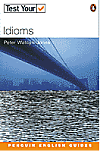

| Book of the Month | ||
 |
Test Your Idioms |  |
Publisher: Penguin English Guides
Author: Peter Watcyn-Jones
€14.00
ISBN 978-0-582-45173-5
Everyone on the English language teaching business knows Peter Watcyn Jones' Test Your Vocabulary series. Now Penguin have decided to extend this format to test students' idioms. There's certainly a large number of idioms to test - English has literally thousands of idioms and more are coming into the language all the time. This book tries to teach students 900 idioms which is an considerable target, but not shooting at the moon. (Trying to do something impossibly ambitious.) Anyone who has used any of the other Test Your Vocabulary books has a good idea what to expect. The book is even the same size as the rest of the series, though the moody picture of a bridge on the cover is evidently meant to be a metaphor symbolizing how learning can take you to new places. Or maybe symbolizing a bridge over troubled water. Who knows?
Inside the covers the user finds the usual mix of gap fills, mixed-up idioms and the occasional black-and-white cartoon requiring you for example, to fit the idiom with its picture. There are 60 different tests which cover a wide range of idioms. There are 154 pages in the book, and the answer key runs from page 136 onwards. The idioms are grouped into six sections - idioms with nouns, idioms with verbs, idioms with adjectives and so on. This dies not really work. For example consider the idiom 'to get into a rut'. (To keep same routine because it has become an almost unbreakable habit). Is this a verb, because 'getting into' is a verb, or a noun because of 'rut' or adjective because the entire phrase is descriptive? Surely a better approach would be to arrange the idioms by type - e.g. idioms of love (e.g. 'fall head over heels') travel (e.g. Get in a rut) or sport (e.g. be stumped). However, once you accept there is no particular logic to how the idioms are presented, the tests work well and are both fun and educational.
Who is this book for? Anyone wanting to improve their knowledge of the richness which idioms being to the English language should consider this book. Likewise, it is sure to join the other nine in the series in the libraries of EFL schools all around the world. As usual with books in this series, it is good for both classes and individual students.
Verdict: Good - but there are alternatives
Assessment 8/10